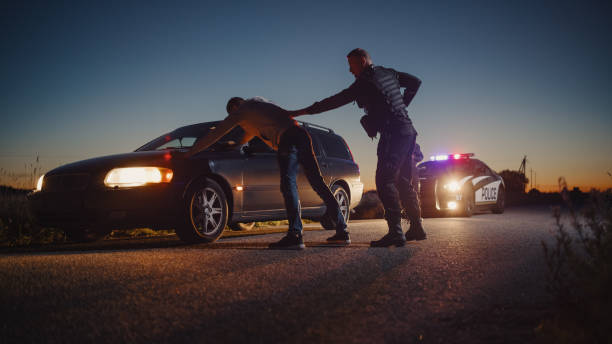Getting pulled over can be nerve-wracking, but if an officer suspects you of driving while intoxicated (DWI), the situation becomes even more serious. A mistake in how you handle it can make things worse. Knowing what to do—and what not to do—can protect your rights and possibly even your future.
Stay Calm and Pull Over Safely
The moment you see flashing lights in your rearview mirror, take a deep breath and stay calm. Panicking won’t help. Signal and pull over as soon as it’s safe, keeping your movements smooth and controlled. If you stop too suddenly or swerve, it could look like you’re impaired—even if you’re not.
Once you stop, turn off the car, roll down your window, and place your hands on the steering wheel. This shows the officer you’re not a threat. Sudden movements, like reaching into your glove compartment, can make things tense. Wait for the officer to ask before reaching for your license and registration.
Be Polite, But Choose Your Words Carefully
The officer will likely ask if you know why you were pulled over. This is where you need to be careful. If you admit to drinking—even just “one beer”—it can be used against you later. On the other hand, lying is never a good idea.
A safe response is something neutral, like, “I’d prefer not to say.” You have the right to remain silent, but being rude or uncooperative can make the officer suspicious. Answer basic questions like your name and provide your license, registration, and proof of insurance when asked.
Should You Take a Field Sobriety Test?
If the officer thinks you might be intoxicated, they may ask you to step out of the car for field sobriety tests. These tests include walking in a straight line, standing on one leg, or following a moving object with your eyes.
Here’s the thing—these tests are designed for you to fail. Even sober people can struggle, especially if they have balance issues, poor coordination, or are just nervous.
In most states, you can refuse these tests, and there’s no automatic penalty. However, refusing might make the officer more suspicious, and they could still arrest you based on other factors, like slurred speech or the smell of alcohol.
Should You Take a Breathalyzer Test?
This is where things get tricky. There are two types of breath tests:
- The roadside breath test (preliminary breath test or PBT) – This is the small, handheld device officers use during traffic stops.
- The official breathalyzer test at the station – This is more accurate and legally significant.
You can refuse the roadside test in most states without automatic penalties. But if you refuse the official breathalyzer test after being arrested, you might face serious consequences, like a suspended license—sometimes even if you’re sober.
Every state has implied consent laws, meaning if you drive, you agree to take a chemical test (breath, blood, or urine) if arrested for DWI. Refusing can lead to license suspension and other penalties, even if you’re never convicted.
What If You Get Arrested?
If the officer believes you’re driving under the influence, they will arrest you. This is when you need to contact a lawyer immediately. The legal system is complicated, and a DWI charge can have serious consequences. A strong DWI legal defense lawyer could mean the difference between a dismissed case and a criminal record.
At the police station, you might have to take a chemical test. Refusing at this point almost always leads to harsher penalties. After testing, you may be booked, fingerprinted, and held until you post bail or see a judge.
What Happens Next?
Once you’re released, the real battle begins. A DWI charge can lead to:
- Fines – Ranging from hundreds to thousands of dollars.
- License suspension – Some states suspend your license automatically, even before your trial.
- Jail time – Especially for repeat offenses.
- Higher insurance rates – Your car insurance could skyrocket.
- A criminal record – This can affect jobs, housing, and even travel to some countries.
A lawyer can help challenge the charges, question the evidence, or even get penalties reduced. Many people think a DWI is an automatic conviction, but that’s not always true.
How to Avoid a DWI in the First Place
The best way to handle a DWI is to not get one at all. If you’re drinking, plan ahead:
- Use a rideshare app or taxi.
- Have a designated driver.
- Stay where you are until you’re sober.
Even if you feel fine, your blood alcohol level could still be over the legal limit. And remember, alcohol isn’t the only issue—certain medications and drugs, even if prescribed, can lead to a DWI charge.
Final Thoughts
Getting pulled over for a DWI is serious, but knowing your rights can make a huge difference. Stay calm, be polite, and don’t say anything that could hurt your case. If you’re arrested, contact a lawyer right away. A single mistake shouldn’t define your future, and the right legal help can make all the difference.




